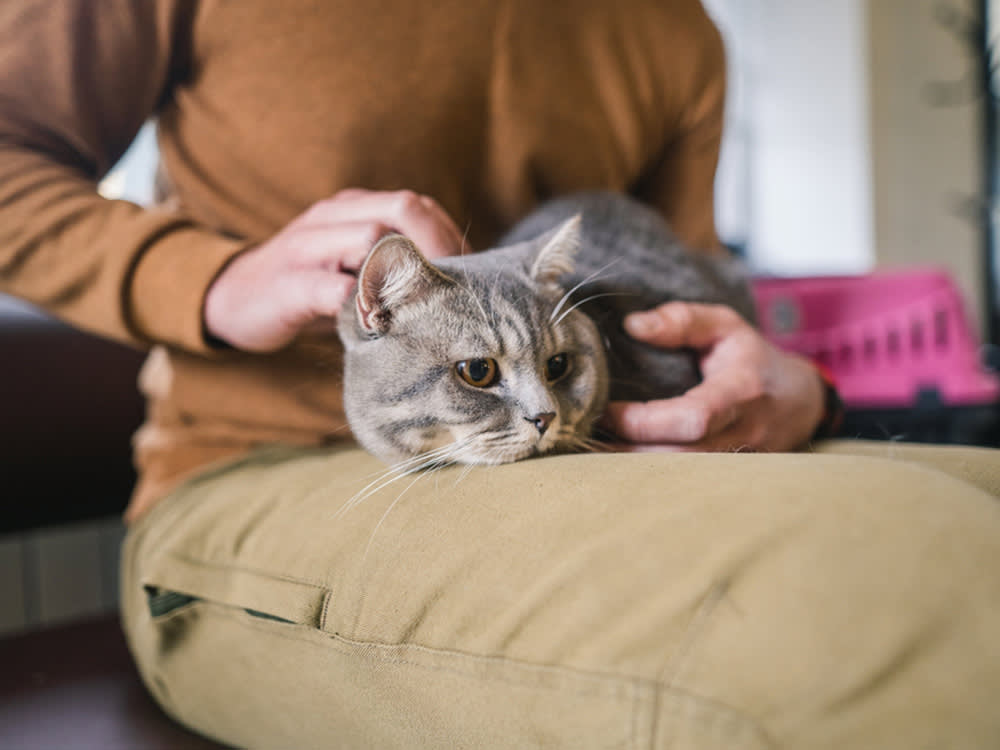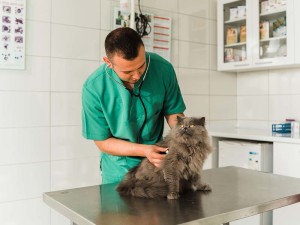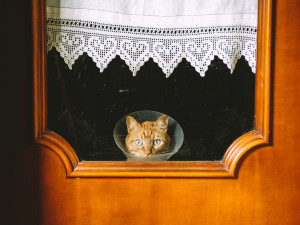Can Cats Get Bird Flu in the UK?
News headlines can be scary, here’s what you need to know to keep your cat safe
In this article:
What is bird flu? Can cats get bird flu? Transmission to cats Bird flu symptoms in cats Action to take Diagnosing bird flu in cats Bird flu treatment in cats Protecting cats from bird flu FAQs
Bird flu and cats have been in the news a lot lately alongside some pretty scary headlines. Over 130 cats in the United States have contracted the disease but how much do we need worry about it in the UK? If you’re starting to worry about your kitty or are just left wondering what bird flu has to do with cats, then read on. In this article we will explain what bird flu is, how it can affect our feline companions and what we can do to keep them safe.
What is bird flu?
Bird flu, or to use its scientific name, ‘avian influenza’, is an influenza virus that primarily affects domesticated and wild birds. There are a number of different strains of influenza virus, each varying in the severity of disease they can cause. H5N1 is a highly pathogenic subtype, which has made headlinesopens in new tab in recent years due its ability to cause severe disease and death in birds across the globe, and also for its ability to infect wild and domesticated mammals, including cats and even humans.
Can cats get bird flu?
Yes, although it is very rare. The H5N1 virus has shown increasing ability to cross the species barrier, causing disease in mammals. The more often this occurs, the better the virus will become at infecting them. Cats are one of the more commonly infected domestic mammals. Between 2003 and 2023, there were 10 outbreaks recorded in cats, but none have yet been reported in the UK.
How is bird flu transmitted to cats?
Cats can become infected by coming into contact with infected poultry or wild birds, particularly waterfowl. Eating raw, infected poultry has also been found to be a risk. There is some evidence suggesting that disease could spread from one cat to another if they are in close contact, but this is exceptionally rare.
Bird flu symptoms in cats
Cats infected with bird flu will have a fever and stop eating. They tend to be lethargic, have difficulty breathing and have red, swollen eyes. Some cats go on to develop neurological symptoms such as seizures, incoordination, blindness, paralysis and death.
What to do if your cat shows symptoms of bird flu
The above symptoms can be caused by several different conditions, all of which are potentially serious, so it is important to get your pet checked by a vet as soon as possible, so that they can be diagnosed and treated appropriately.
How vets diagnose bird flu in cats
Bird flu is very rare and many conditions could cause the symptoms described above. Your vet will likely perform a number of diagnostic tests to rule other diseases out first. If bird flu is suspected your vet will take a swab from the back of your cat’s throat or nose, similar to the swabs we took from ourselves during COVID. These samples are then analysed for influenza virus at a laboratory. Surprisingly, these swabs are well tolerated by most cats, although some may require sedation.
Bird flu treatment for cats
Viral infections are notoriously tricky to treat. Antibiotics don’t work against viruses and, although antivirals are helpful against certain viruses, they have so far been unsuccessful in treating bird flu in cats. Treatment is generally supportive, which might involve giving oxygen and fluids, whilst treating any secondary issues that arise until the disease runs its natural course. Sadly bird flu is often fatal in cats, but there have been some cases where cats have survived with supportive care.
How to protect your cat from bird flu
Areas affected by bird fluopens in new tab are constantly evolving so it is important to keep yourself up to date with local news and government guidance. If you live in an unrestricted area and your cat goes outdoors then keep an eye out for the symptoms described above and contact your vet if concerned. If you live in a restricted area then it is advisable to keep your cat indoors.
Keep them away from deceased wild birds. Waterfowl carry a larger risk than garden birds, although both pose a threat.
Never feed your cat raw poultry, game bird or wildfowl meat.
Bottom line: bird flu in cats
While bird flu infections in cats are extremely rare, the virus is changing, and we need to stay alert. If bird flu becomes more common in mammals, the risk to cats could increase.
For now, being aware of outbreaks in your area and keeping your cat away from potential sources, such as raw poultry or infected wild birds, is the best way to reduce risk.
Bird flu and cats: frequently asked questions
Can people get bird flu from cats?
There has been a few very rare cases of bird flu passing from cats to humans. Whilst this is extremely uncommon, this risk may increase as the virus mutates.
Is there a bird flu vaccine for cats?
There is no licensed vaccine available at the moment, although this is something that scientists are actively researching and may become an option in the future.
Can a cat recover from bird flu?
Unfortunately, bird flu is often fatal in cats, but some cats have recovered with prompt veterinary care and supportive treatment.
References
Piotr Rzymski (2023). Avian influenza outbreaks in domestic cats: another reason to consider slaughter-free cell-cultured poultry? Frontiers in Microbiology, 14. doi:https://doi.org/10.3389/fmicb.2023.1283361opens in new tab.
Marschall, J. and Hartmann, K. (2008). Avian influenza A H5N1 infections in catsopens in new tab. Journal of Feline Medicine and Surgery, 10(4), pp.359–365. doi:https://doi.org/10.1016/j.jfms.2008.03.005.
Coleman, K.K. and Bemis, I.G. (2024). Avian Influenza Virus Infections in Felines: A Systematic Review of Two Decades of Literature. [online] https://www.medrxiv.org/. Available at: https://doi.org/10.1101/2024.04.30.24306585opens in new tab [Accessed 12 Jun. 2025].
Web, A. (2025). Vet Times: Latest Veterinary News, Jobs & Clinical Resourcesopens in new tab. [online] Vettimes.com. Available at: https://www.vettimes.com/news/vets/small-animal-vets/uk-plays-down-fears-over-us-avian-flu-cat-death-link-to-food [Accessed 12 May 2025].
BSAVA. (2025). High Pathogenicity Avian Influenza (HPAI) H5 found in cats on poultry farm in Belgium | BSAVAopens in new tab. [online] Available at: https://www.bsava.com/article/high-pathogenicity-avian-influenza-hpai-h5-found-in-cats-on-poultry-farm-in-belgium/ [Accessed 12 May 2025].
APHA Surveillance for Avian Influenza in Wild Birds and Wild Mammals in GBopens in new tab. [online] Available at: https://experience.arcgis.com/experience/062722fea8b24285b46fa6fc02b9fb51/page/Page/.








